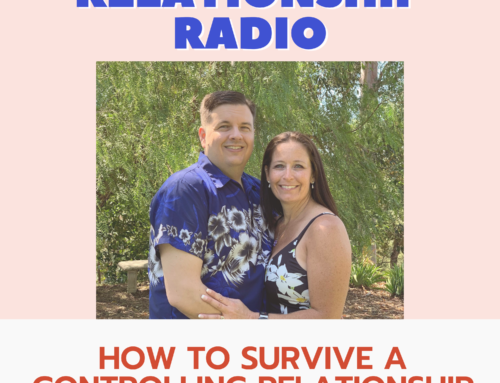Are you caught in a marriage with a controlling spouse? Or, have you been accused of being controlling in your marriage? Living under the constant scrutiny of a controlling spouse is an exhausting exercise in futility. This person will never be satisfied, will never be wrong, always knows what’s best for you and feels the need to make sure you know that fact as well. Not only that, but the need to control every aspect of your own life as well the life and actions of your spouse and children be exhausting. There’s never a break.
Treated Like a Child
All too often the spouse of a controlling person feels like he or she is treated like a child in the relationship. They feel their partner does not trust them to do even the simplest of tasks without being corrected. Sometimes the level of control in the relationship surpasses even that and the controller dictates who his or her spouse can see, where he or she can go and for how long until the controlled person no longer has any personal autonomy or identity.
Though a person may live for years under such circumstances, there is often a slow, quiet boil underneath the surface. One day it will boil over and it often occurs once it is too late to save the marriage. The spouse that allowed him or herself to be controlled will suddenly be ready to leave and the controller will often not even see it coming.
What’s the Definition of Control?
A good working definition of control could be stated as “exerting influence over one’s environment or the actions or behaviors of another person [and] is sometimes used excessively by those who fear the unpredictable and ambiguous, feel they need to prove themselves, or fear losing control. The incessant need for control can be overwhelming and exhausting, wreaking havoc on relationships, careers, and overall quality of life.”*
Essentially, the need for control boils down to fear. Perhaps the controller has been hurt, abused or traumatized in some other way. The fear of the loss of control can be caused by a myriad of traumas: childhood abuse, death of a parent, divorce in the family of origin, prior infidelity, just to name a few. Whatever the cause (with perhaps the exception of is a psychological issue with an underlying physiological cause needing medical care) the controller can learn to change his or her behavior.
What does control look like?
There are several ways control can play out in the life of the controller and his partner.
• Micromanagement. The controller must have a hand in every aspect of a task. The dishes must be loaded in a certain way, the floor must vacuumed with the grain a certain direction, the budget needs to be color-coded in a certain pattern. This can also be anything from backseat driving to interference in how the other partner parents, especially correcting parenting in front of the children.
• Limitations on relationships outside the marriage. The controller expresses unreasonable jealousy toward reasonable relationships. It is perfectly appropriate for a wife to have female friends and a male to have male friends and for either spouse to have strong relationships with their families of origin. It is not control to expect that the marriage relationship come first, it is control when you are severely or completely limited in how often you may speak with your friends and family. It also not control to expect that friends outside the marriage be positive toward marriage and to be of the same sex. You should not have to be asked to leave behind friends that tear down your marriage relationships, but you should be able to make plans with good and positive friends that are of the same sex as you without fear or criticism.
• Hovering. This behavior often occurs in relationships where the controller has suffered some consequence of infidelity. It may be that a prior spouse cheated or that a parent cheated or even that the controller cheated in a prior marriage. The controller completely lacks trust in his or her partner and constantly checks up on the spouse with phone calls and texts while the two are apart. It may even lead to the controller following and spying on the other spouse. The controller suffocates and infuriates the other spouse by clearly demonstrating a lack of trust.
• Bullying and emotional abuse. We all know when we are being bullied. The bully over-talks, shouts down and verbally belittles his or her spouse. This happens to ensure that the controller gets his or her own way or to make sure that the controlled spouse understands that the consequence of not agreeing or towing the line will be very grave.
• Positioning oneself as the weaker partner. The controller in this case, rather than bullying, threatens to fall apart when his or her demands are not met.
• Gaslighting. The term “gaslighting” comes from a 1938 play in which a woman’s husband subtly manipulates her environment in order to cause her to question or doubt her own senses and reality. The aim of gaslighting is to, in fact, cause the victim to doubt his or her reality, identity or sense of the truth. Gaslighting can be an indication of deeper psychological issues and I recommend seeking professional help in confronting or managing the spouse who displays this behavior. It does not have to be a physical manipulation of the environment and can be entirely psychological and verbal. Some tactics of “gaslighting” include:
-Refusing to listen to any concerns or pretending not to understand them.
-Questioning his or her memory, denying that events occurred in the way the victim (accurately) remembers.
-Changing the subject to divert the victim’s attention from a topic, trivializing their concerns.
-Pretending to forget things that have happened to further discredit the victim.
-Denying events have taken place, claiming that the victim is making them up.
Can a Controller Ever Change?
Can a marriage that has been damaged by control issues ever be fixed or reconciled? The answer to both of those questions is yes. It requires work and a good deal of evaluation and rigorous honesty when looking at the person in the mirror, yet change can and does occur in controllers and their marriages frequently experience healing.
So what’s next?
What should you do if you are the victim of a controller? First, your controlling spouse probably does not view himself that way. He (or she) simply acts out of a conviction of “rightness.” In other words, the controller is so completely convinced of the rightness of his demands or expectations that he is nearly unaware—or chooses to ignore—the fact that you would have a difference of opinion. It is good and right to set clear boundaries with your spouse. It is perfectly valid to express the fact that you feel treated like a child when micromanaged.
Setting Boundaries
Before you set these boundaries, think about what you really want first. For instance, perhaps you aren’t allowed to do the budget, manage the money, work outside the home, go out with friends, do the dishes your own way, wash the car, or any number of things that your spouse thinks you won’t handle well and so does them. What tasks are important for you to do for yourself?
For instance, I do not touch the budget nor do I manage any of our money. I honestly don’t even ask much about it. Occasionally, I need to know if I can purchase something I want or need and I have to ask. But, I do not want to be responsible for the budget. I am perfectly contented not dealing with the stress of it. In other words, if your spouse is genuinely more organized with the budget and does manage it better than you could, let him do it.
Perhaps your spouse is a neat freak and needs everything done just so. It is perfectly valid to expect a reasonably clean home from one another. It isn’t necessarily valid to demand that the cleaning get done a certain way. It is now unreasonable. You may need to say, “I need you to allow that the way I accomplish tasks is good enough and not correct me about them.” Or, “Please allow me to be the parent that I am. If you have a real concern about the way I discipline the children, please do not correct me in front of them. Withhold your thoughts until we can discuss them privately.”
Arguing and Blaming won’t Yield Results
If your spouse is not responsive or continues to right fight with you, it is best not to argue back. In fact, expect the controller to be angry at first. Understand that if you have had little to no boundaries with the controlling spouse up until now, he or she might feel threatened by the shift. Stating your boundary in a genuinely calm manner and sticking to your boundary is best. If your controller refuses to change, don’t allow yourself to get fed up to the point of marital disintegration. Seek help first!
What If I am Accused of Controlling?
If your spouse claims that you are the controller, I urge you to take an inventory of yourself and your behavior. Look over the controller characteristics and doing everything in your power to honestly answer the question: Do I display these traits? If you see some of these patterns in yourself, that is the first step to change. You can come to compromises and agreements with your spouse where you both feel that your needs are met, that you are respected and that you are equals. If you still don’t see control issues in yourself and your spouse does, I recommend you still seek help. Clearly there is some problem, real or perceived, that needs addressing.
Don’t Let Your Marriage go Without a Fight!
Suppose you have been struggling with a controlling spouse for many years and you’re fed up. Suppose your spouse is accusing you of being controlling and is threatening to leave. Consider counseling with a really good (hopefully Christian) counselor that will support your desire to keep your marriage intact. Another great resource in dealing with the heavy toll control takes on marriage is to come to a Marriage Helper weekend. Joe Beam and his staff have developed tools over many years of working with couples and through in depth study of the marriage relationship. Don’t give up. We can help.
If your marriage is in danger of separation or divorce, call us at (866) 903-0990 to speak with someone or use the form here to request more information about our Marriage Helper workshop for troubled marriages. We can help you save your marriage even in cases of infidelity, loss of trust, anger, sexual problems, and other issues. (If you’re thinking your spouse would never come, contact us by phone or the form below and we’ll tell you what others who felt the same way did to get their spouses there.) We will keep everything you tell us completely confidential. Our motivation is to help you determine if this workshop is right for you and your particular situation.





